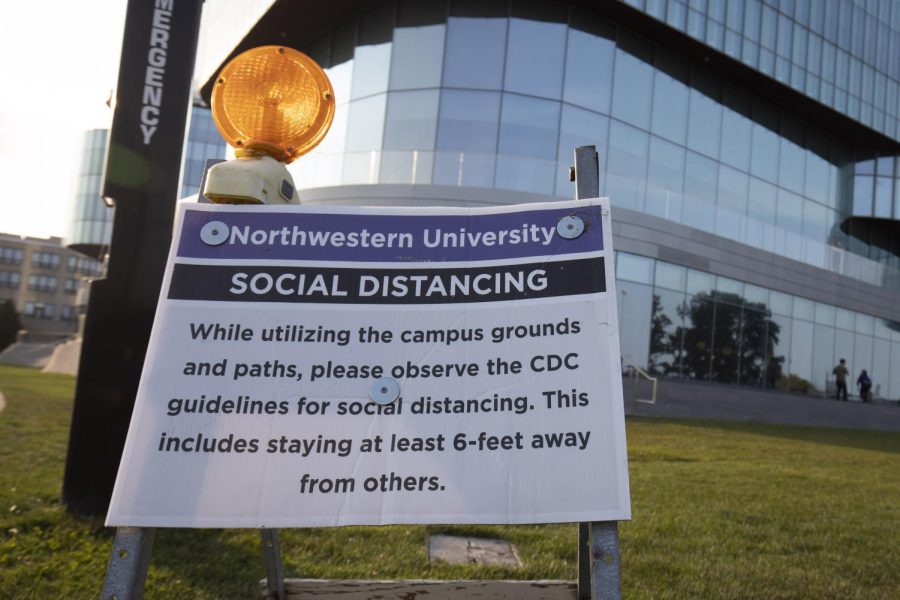University’s updated quarantine and isolation protocol inconsistent with CDC’s recommendations
Daily file photo by Joshua Hoffman
While the CDC now recommends a shortened five-day isolation period for COVID-19-positive individuals asymptomatic or with resolving symptoms by day five of isolation, at NU, updated isolation policies are inconsistent with national guidelines.
January 1, 2022
Northwestern announced modifications to its COVID-19 quarantine and isolation procedures in a Dec. 31 email after the Centers for Disease Control and Prevention updated its guidelines Monday. However, NU’s changes are inconsistent with national guidelines.
The CDC now recommends a shortened isolation period of five days for those who test positive for COVID-19, regardless of vaccination status, given they are asymptomatic or have resolving symptoms — defined as no fever for 24 hours — by day five of isolation.
The University’s recent changes to its isolation policy state that asymptomatic individuals who test positive will only be released after five days given that they test negative using a rapid antigen test on the fifth day or later.
The previous University policy indicated a 10-day isolation period beginning the day the individual tested positive or started experiencing symptoms — whichever occurred later. While the CDC still advocates for this isolation period if an individual doesn’t meet the asymptomatic or resolving symptoms criteria, it is unclear in what circumstances this still applies at the university level.
According to the CDC, a symptomatic individual who tests positive can still be considered for the shortened isolation period given they meet the fifth-day criteria, an inconsistency with the University’s updated policies. Unclear guidelines are also provided in the cases that an initially asymptomatic individual starts to experience symptoms before the fifth day of isolation or receives a positive antigen test on the fifth day.
The CDC does not address additional testing after the five days. Previous national guidance discouraged testing individuals within 90 days after they have tested positive for COVID-19, given prolonged detection of the virus despite the individual not necessarily being contagious. This is supported by a 2020 study published in the Annals of Internal Medicine, where results showed that an individual with COVID-19 still has a 34% chance of testing positive 16 days after symptom onset.
Eligibility for the shortened isolation period, according to the CDC, is not contingent upon whether an individual is asymptomatic when they first receive a positive test result. Rather, their guidelines state that individuals who test positive may be released if asymptomatic on the fifth day of isolation. A symptomatic individual can still be released on the fifth day, according to the CDC’s newest guidelines, if they haven’t experienced a fever in the 24 hours prior.
The University does not require vaccinated individuals who received a booster shot to quarantine if exposed to a positive case. Instead, these exposed individuals are required to take an in-person COVID-19 test five days after exposure. This policy aligns with CDC recommendations.
However, the CDC also specifies this group should immediately self-quarantine at the onset of symptoms until negative test result confirmation afterwards — something the University has not specified in their guidelines.
Per advice from public health partners, the University has also suspended contact tracing efforts during Wildcat Wellness given low effectiveness rates amid high transmission on campus.
NU quarantine policy for unvaccinated individuals and those eligible for, but who have not received a booster, aligns with the CDC’s five-day quarantine recommendation. The University additionally specifies that this group must receive a negative test result on the fifth day of quarantine to be released.
The University’s email did not mention whether individuals who previously tested positive for COVID-19 90 days prior are exempt from a quarantine period.
Email: [email protected]
Twitter: @amittal27
Related Stories:
— Northwestern goes remote for first two weeks of January
— Northwestern announces COVID-19 booster shot requirement
— The Daily Explains: Wildcat Wellness guidelines and updated winter COVID-19 campus protocols












